Get found. Get booked. Our proven solar SEO strategies, keywords, schema, content, and backlinks that turn Google searches into real customers.
5.0



The U.S. solar market will hit $104 billion by 2032, and this growth has made competition brutal. Door-to-door sales and cold calls no longer work in crowded states like California and New York. Digital ads are costly, and lead farms sell the same contacts to multiple installers, killing close rates.
Homeowners still hold outdated beliefs (“solar only works in full sun,” “you need to go off-grid”). Those are issues your content should solve automatically. In mature markets, price wars shrink margins, and delayed PTO payments strain cash flow.
That’s why SEO for solar is essential. It helps you reach qualified homeowners, educate them early, and generate consistent, high-quality leads.
Let us share the SEO strategies that our SEO experts and consultants implemented for solar companies, as we’ve helped 30+ others just like you in the U.S.
Keyword research helps you understand what homeowners actually search for on Google, your real market demand.
Start by listing your core services, such as:
Then, use SEO analysis tools like Ahrefs, SEMrush, or Google Keyword Planner. Type in a main term like “solar installation” and look for long-tail, low-competition keywords, phrases that attract homeowners already considering solar.
For instance, instead of just “solar installation,” target keywords like “residential solar installation in phoenix” or “best solar panel installer near me.” These are easier to rank for, have higher traffic and CTR potential, and bring in higher-intent leads.
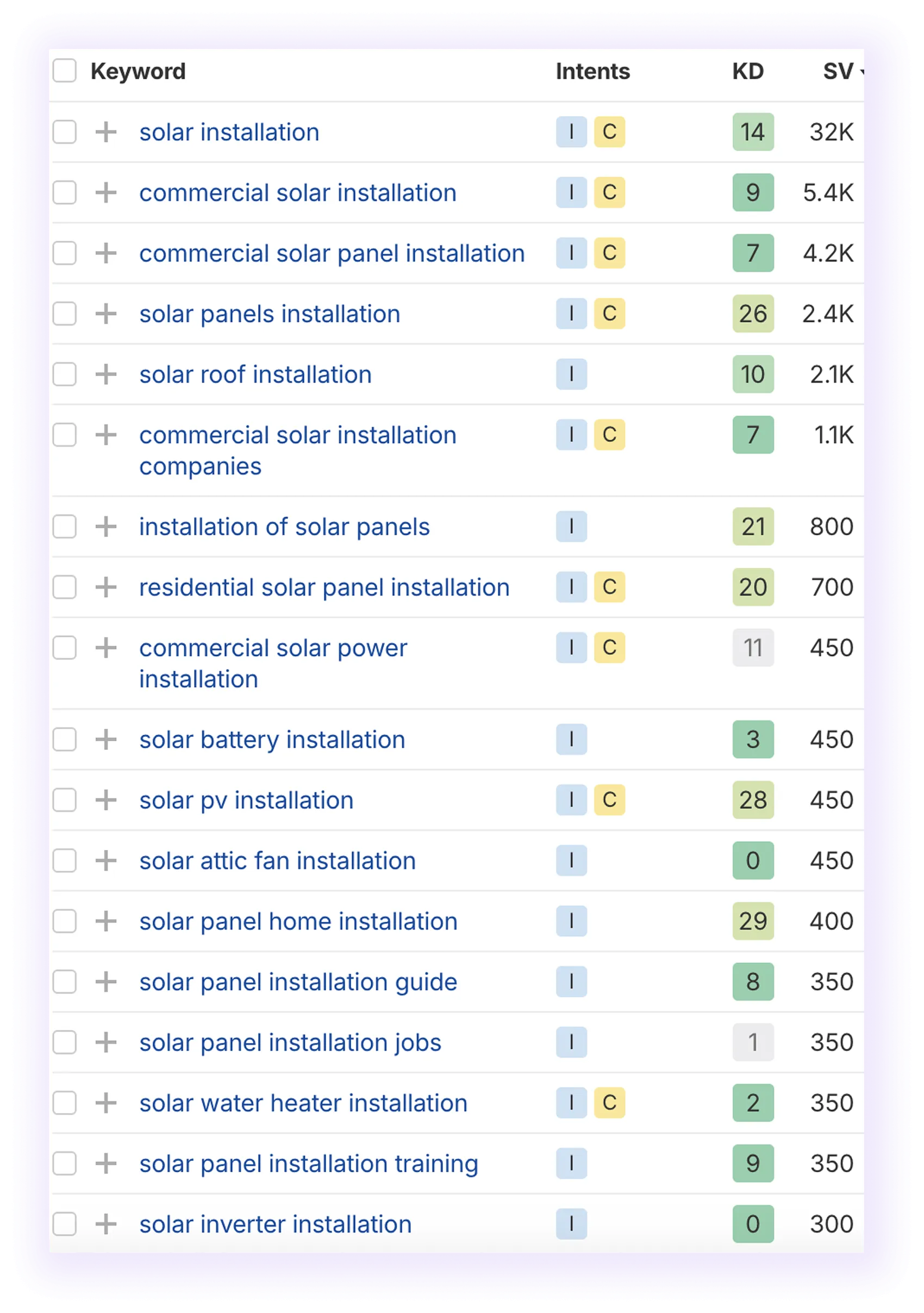
Next, dig into location-based searches. Use local filters in your keyword tools to see how people search in your service areas, think “solar panel financing miami” or “solar battery storage austin.” These help you reach nearby homeowners actively looking for solutions.

And while long-tail keywords drive conversions, don’t ignore broader terms like “solar company” or “solar services.” Add your city or region to them (“solar company san diego”) to boost brand visibility and local trust.
If this research process feels overwhelming or unclear, you can use our SEO keyword research system to simplify it.
Those are 30 really useful keywords for any solar company SEO strategy. But there are hundreds more, just as effective, and our solar SEO agency can help you get them, along with a complete plan for using them. Just contact us and let’s get started!
After gathering your keywords, use them to shape your site’s structure. Each primary keyword should map to a page focused on that topic. For a solar company, three core pages are essential:
Make sure these pages appear in your main navigation so both users and Google can easily find them.

Create a dedicated page for each solar service you offer, and optimize it for its main keywords. For example:
On each page, clearly explain how your team handles the service and what homeowners can expect (process, benefits, timelines, or warranties). This builds trust, and we’ll cover it more later.
Once your pages are ready, group them under a “Services” tab in your navigation menu. Use a simple dropdown for better UX. You help Google understand your site structure better this way.

If you offer solar services for both residential and commercial properties, create separate pages for each. Add them to your main navigation so visitors can easily find the right category and see related sub-services when they hover or click.


Many solar companies offer services across neighborhoods, cities, or even states, and it’s essential to clearly show where you operate. For each location page, you need to focus on keywords like these:
After you create dedicated pages for each location, you should include them in your

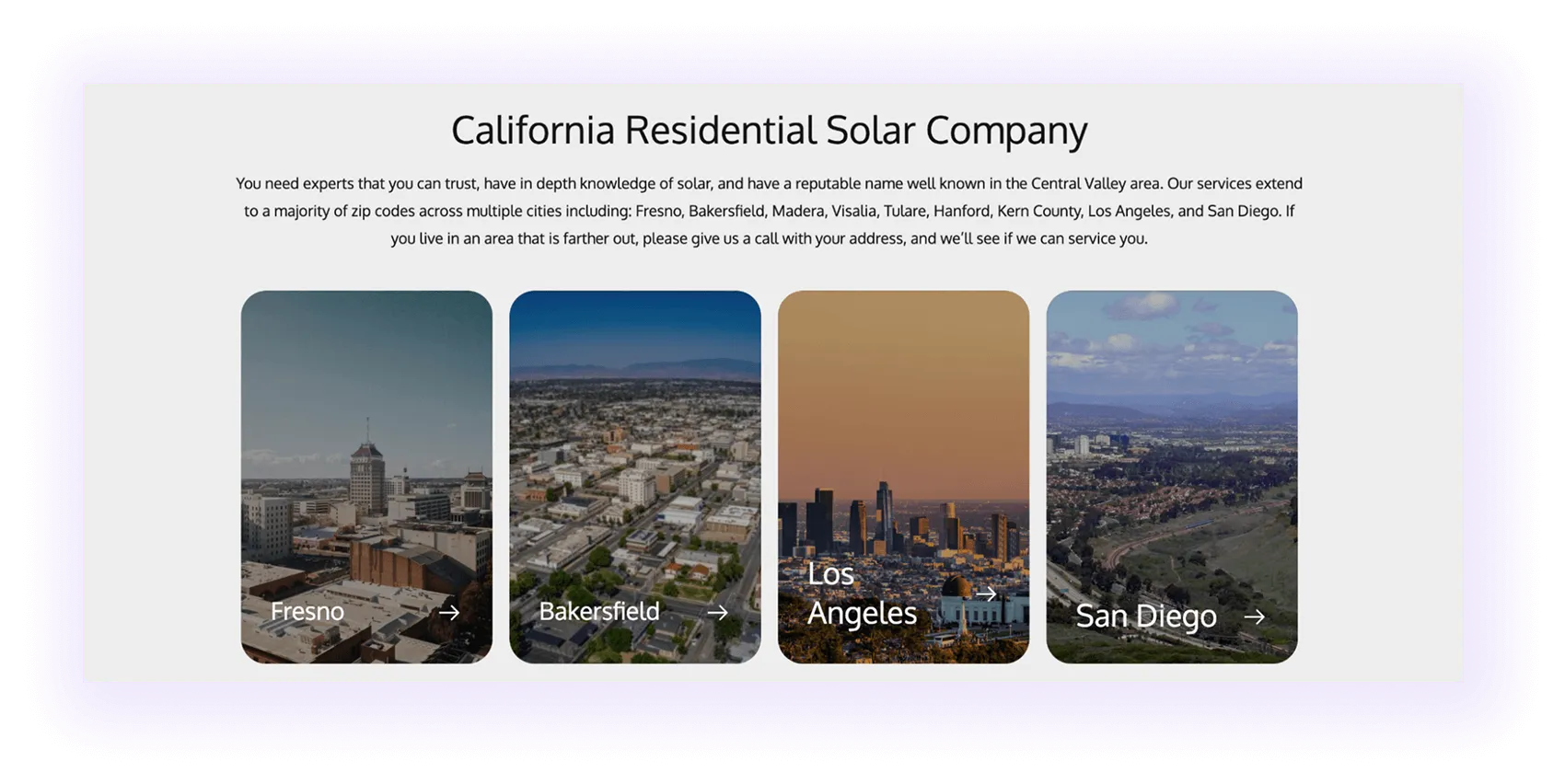
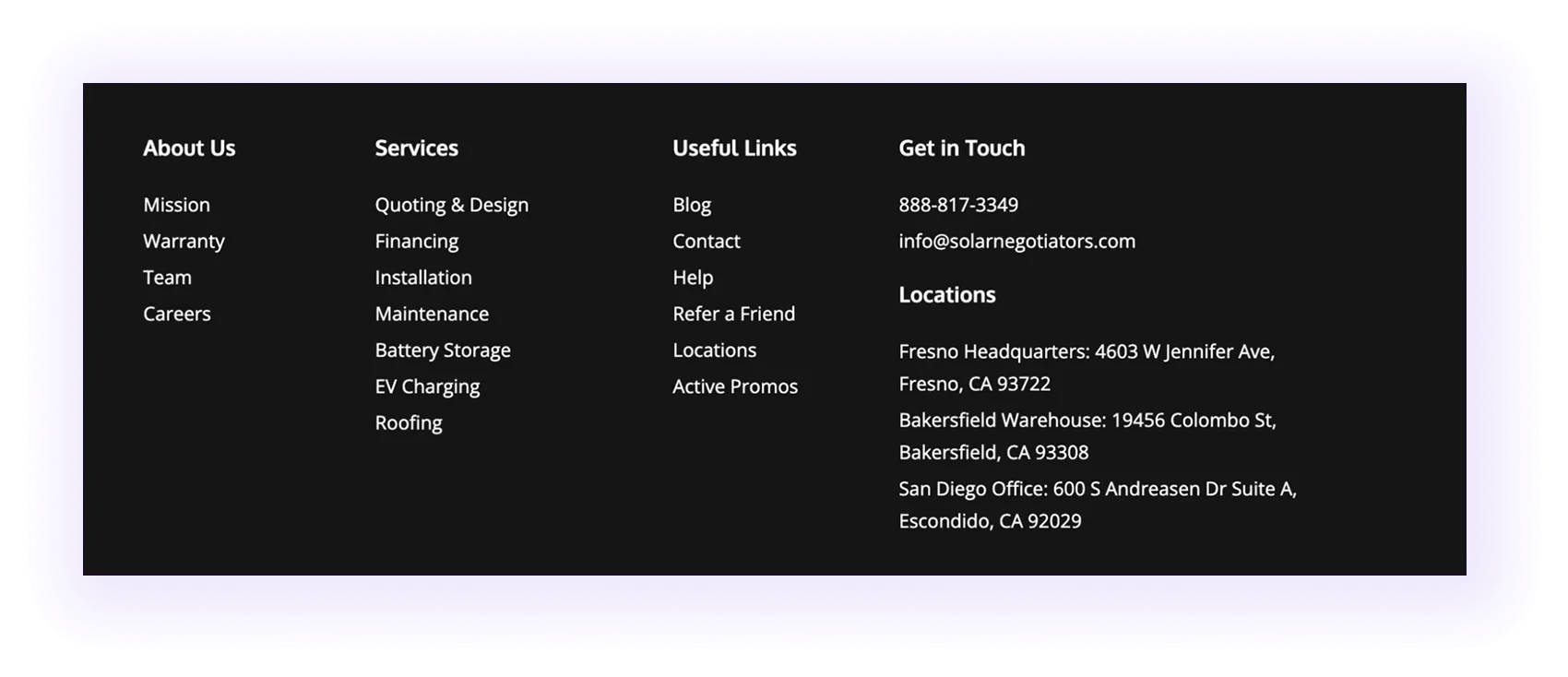
Although this is just the beginning of your local ranking roadmap, it helps Google understand where you operate and boosts your local SEO visibility.
Blogs are key for educating homeowners and clearing up solar myths. Many people still search for answers to questions like:
Creating posts that tackle these topics helps you build trust and attract homeowners researching solar online.
Later, we’ll cover how to organize these posts using a pillar-cluster strategy to boost solar company SEO.
Keywords - done. Structure - in place. So why aren’t the calls coming in? Contact our solar SEO agency, and we’ll help you pinpoint exactly what’s missing.
To reach local searchers, creating location pages isn’t enough. The approach depends on whether you’re:
Each needs a different strategy, so let’s explore those.
If your solar business operates from one location, say, New Jersey, make sure every page, including your homepage and service pages, targets that area. National brands with massive budgets often dominate search results, so local optimization will make you stand out.
Example Structure:
Homepage: solar company in new jersey
Service Pages:
Adding your city or state to keywords helps you rank faster and attract nearby homeowners actively searching for solar services.
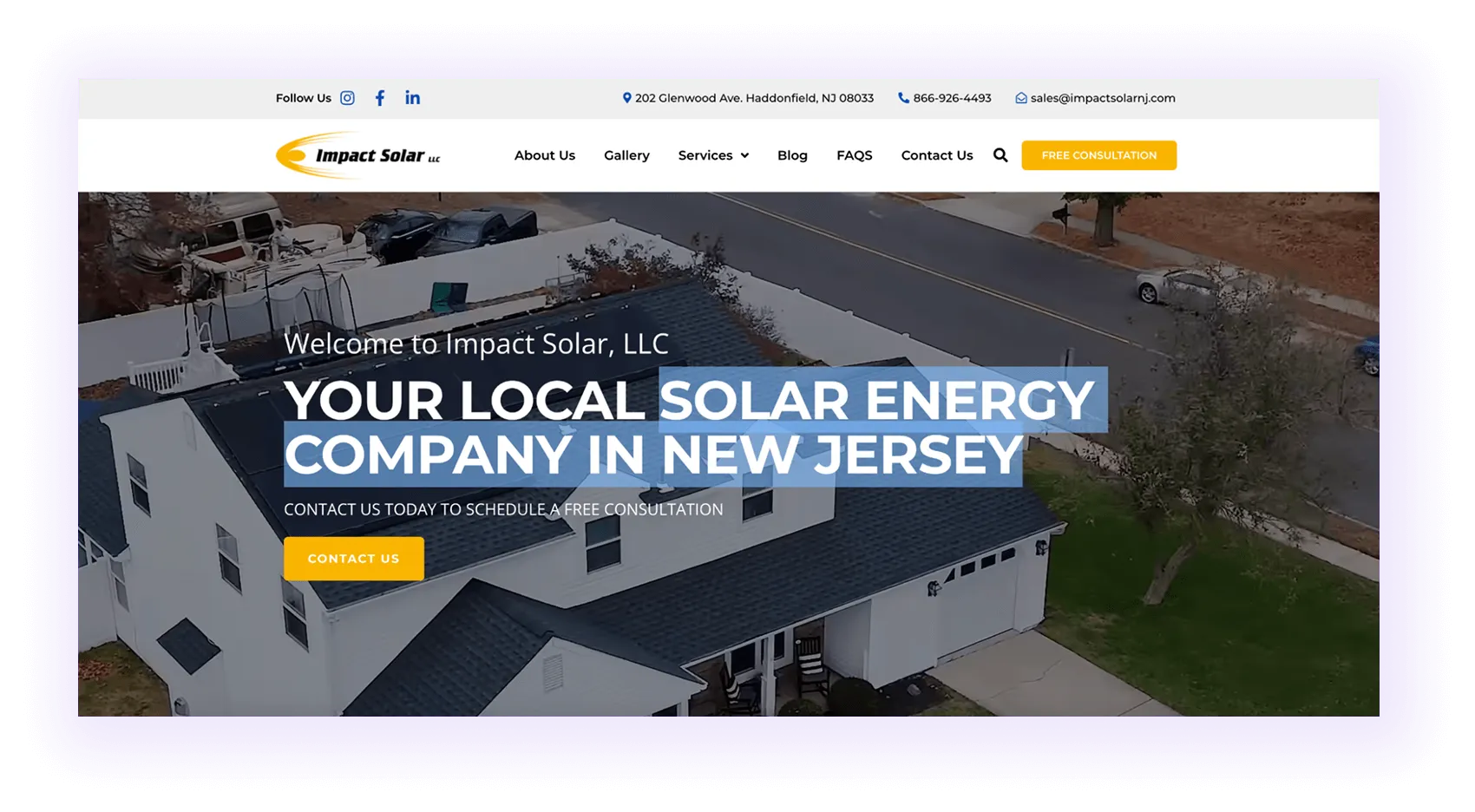
Build a Location Hub page if you’re offering services in multiple neighborhoods, cities, or states. Think of it as your solar service map. You can even include an interactive map to help visitors find their nearest branch fast.
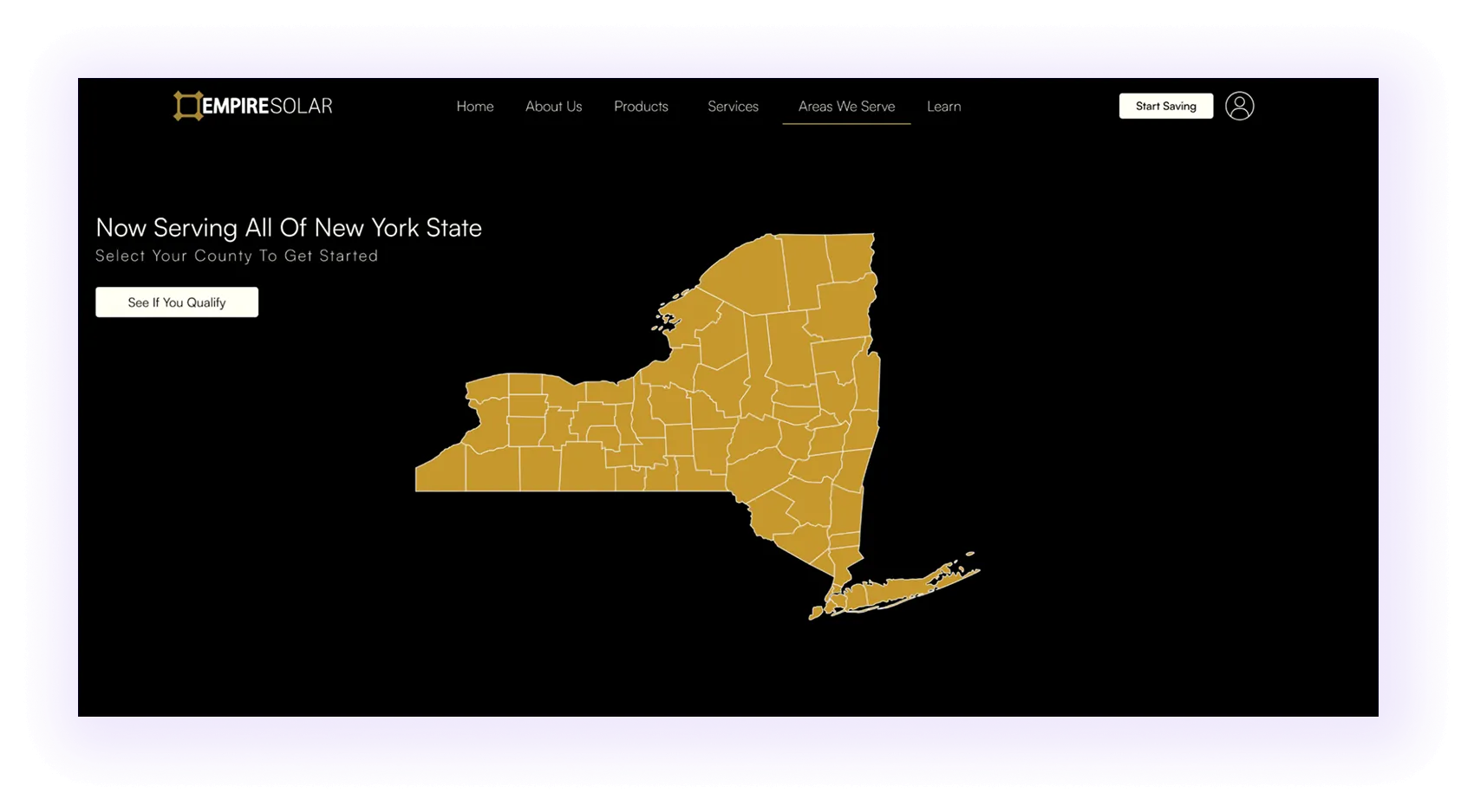
Each location page should target its own keyword set, for example:
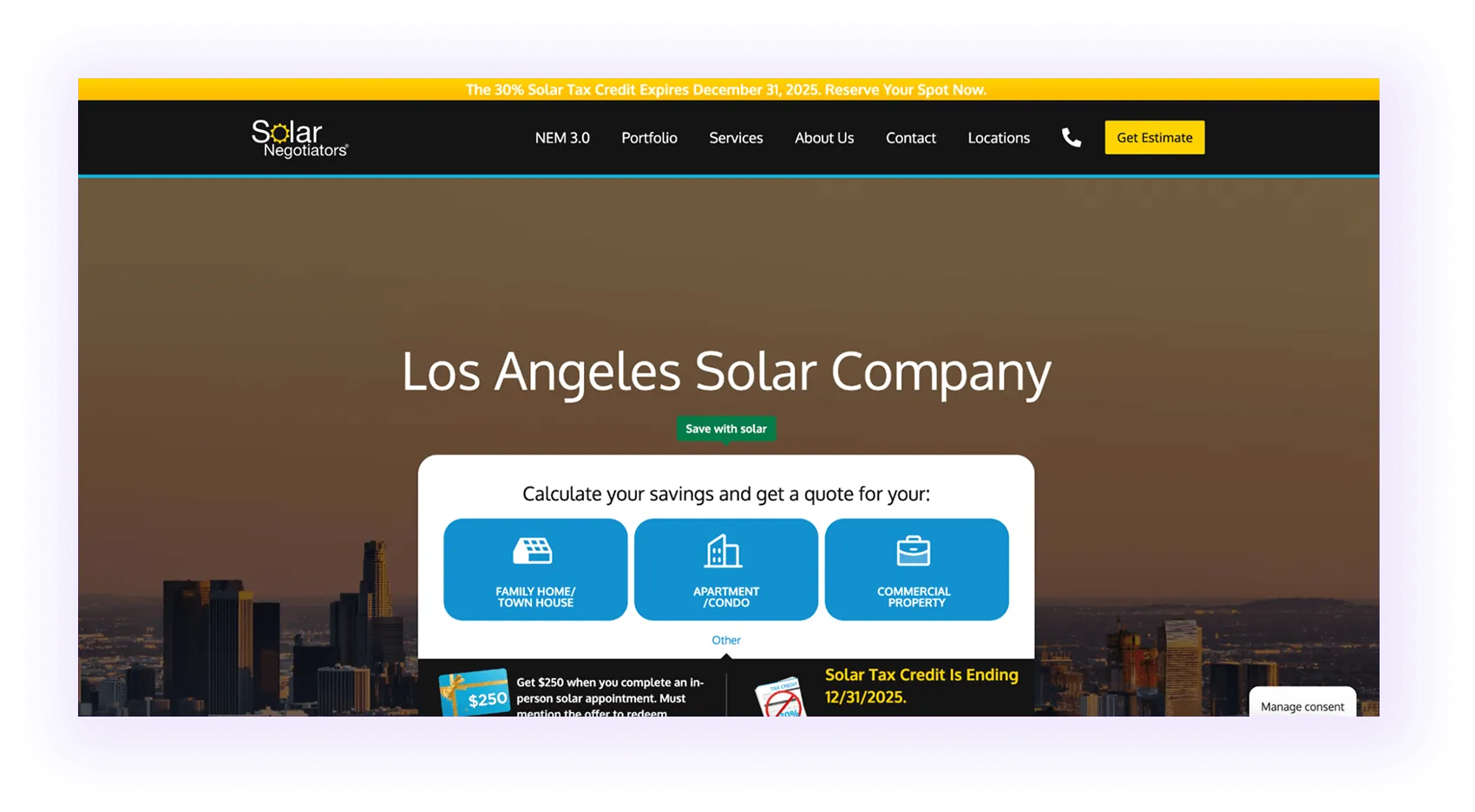
Keep URLs clean and consistent. This structure signals to Google exactly where you operate and helps local homeowners find you in search, no matter which city they’re in.

Because local SEO requires ongoing effort and experience, solar companies often rely on professional regional and local SEO services to move faster and stay focused on their core operations.
Local SEO for solar can get tricky: Google’s categories often overlap (“solar energy contractor”, “solar company,” “energy equipment supplier”). That’s why your Google Business Profile (GMB) must be precise and fully optimized to show up for the right searches.
Let’s level up your Google Business Profile:
These steps are based on real-world Local SEO statistics and insights. Following these steps ensures your profile ranks well on Google Maps and attracts nearby homeowners searching for solar solutions.
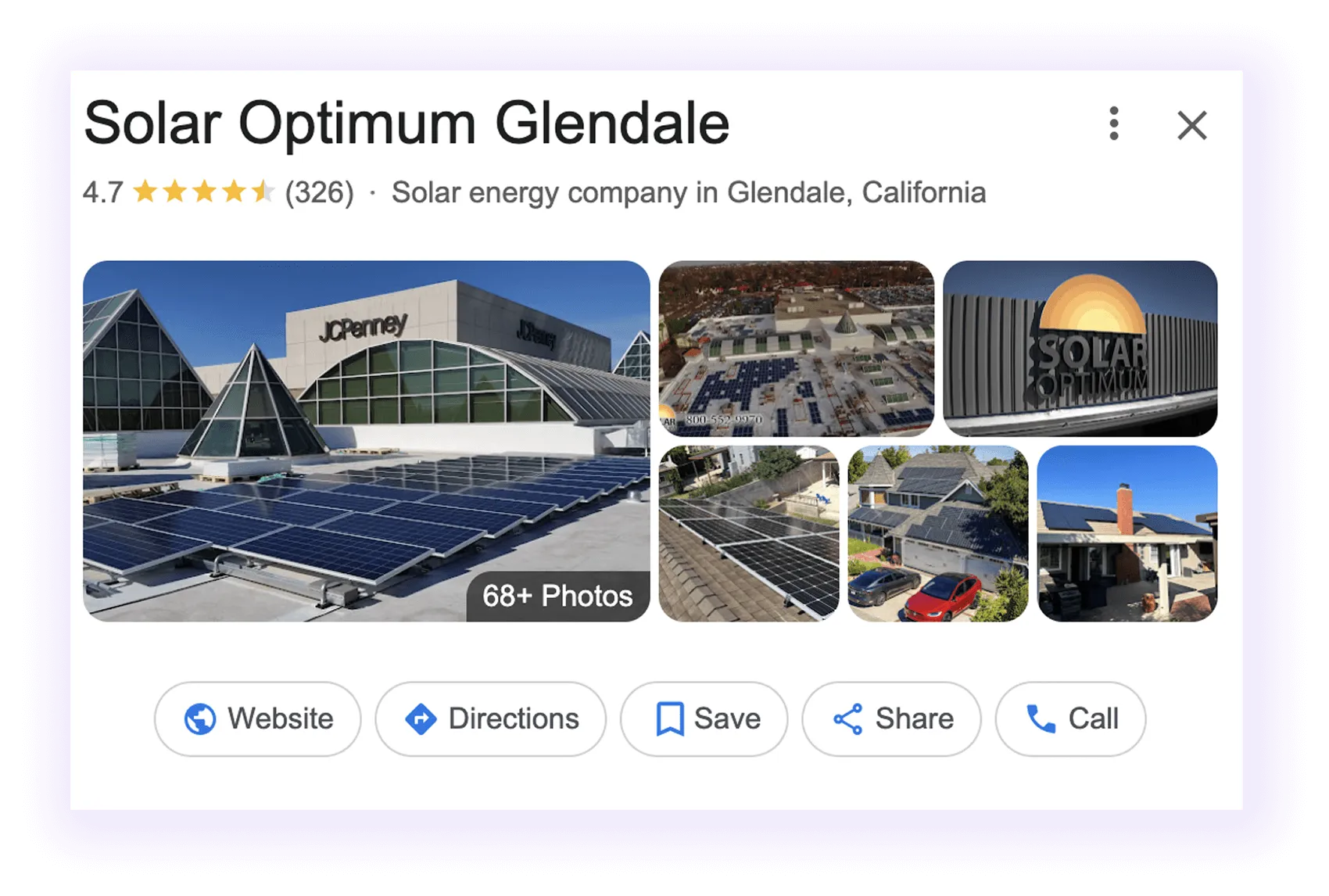

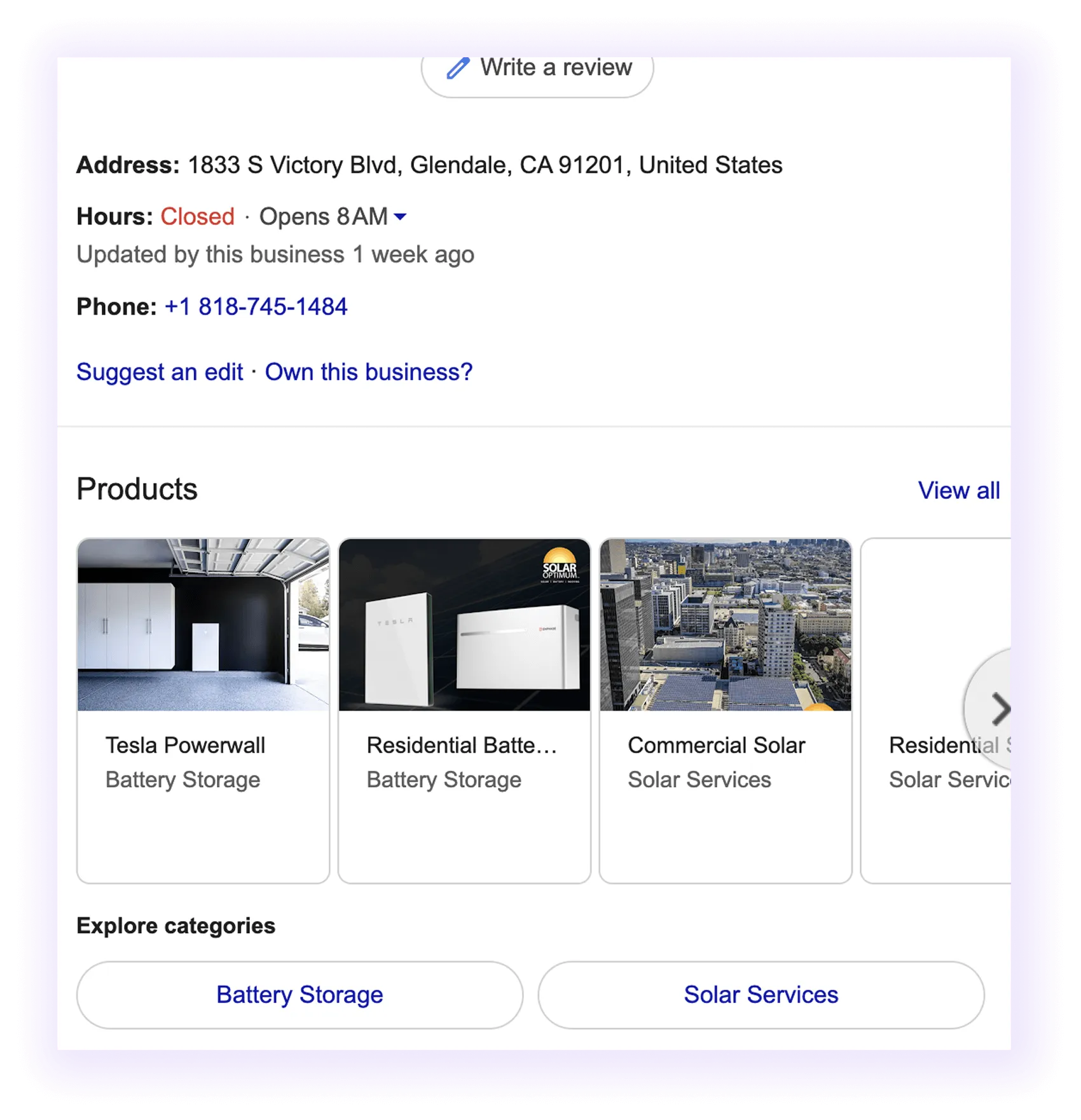
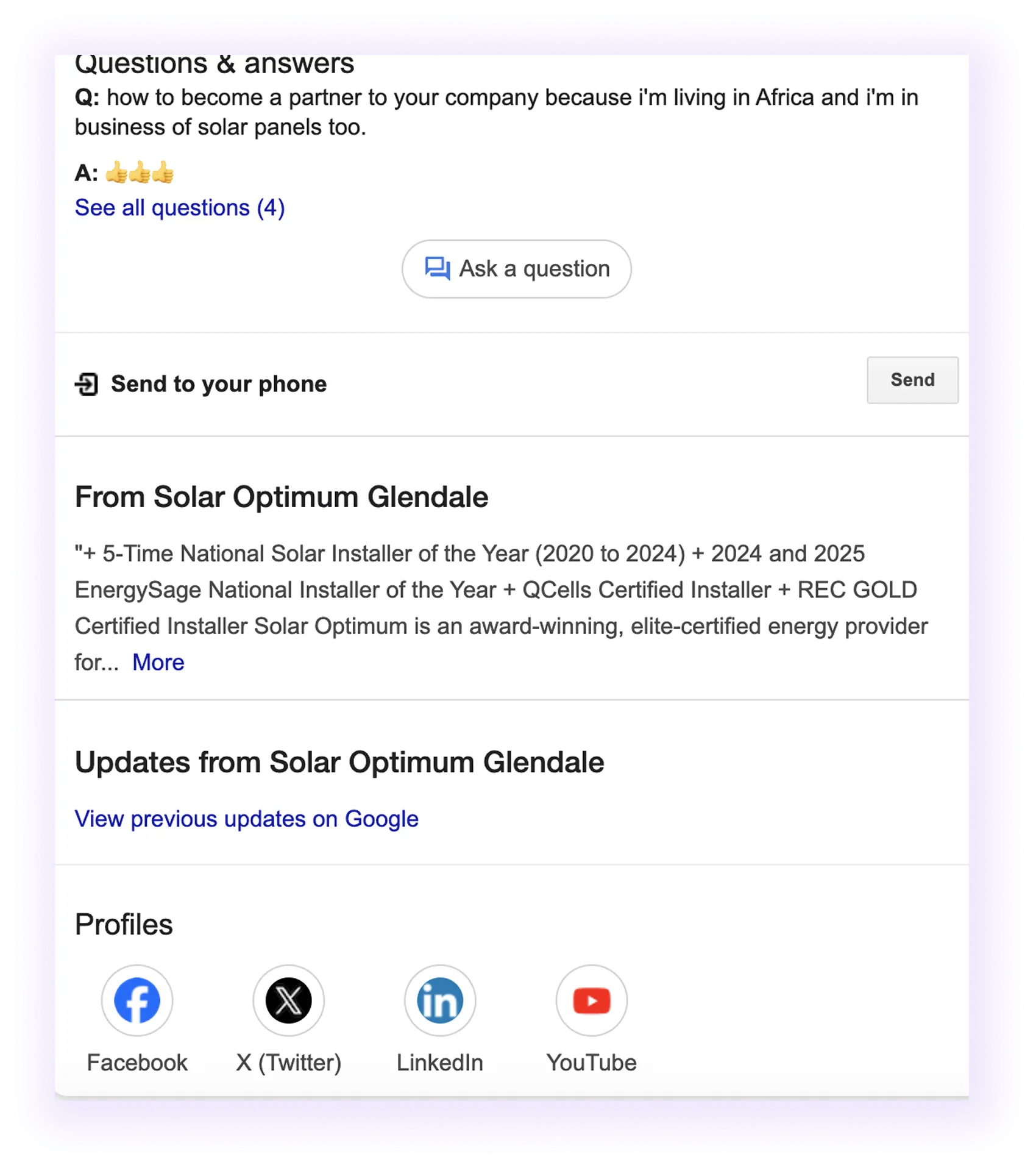
When your Google Business Profile is optimized, your solar company starts appearing in Maps results, and that’s where local customers are ready to book.
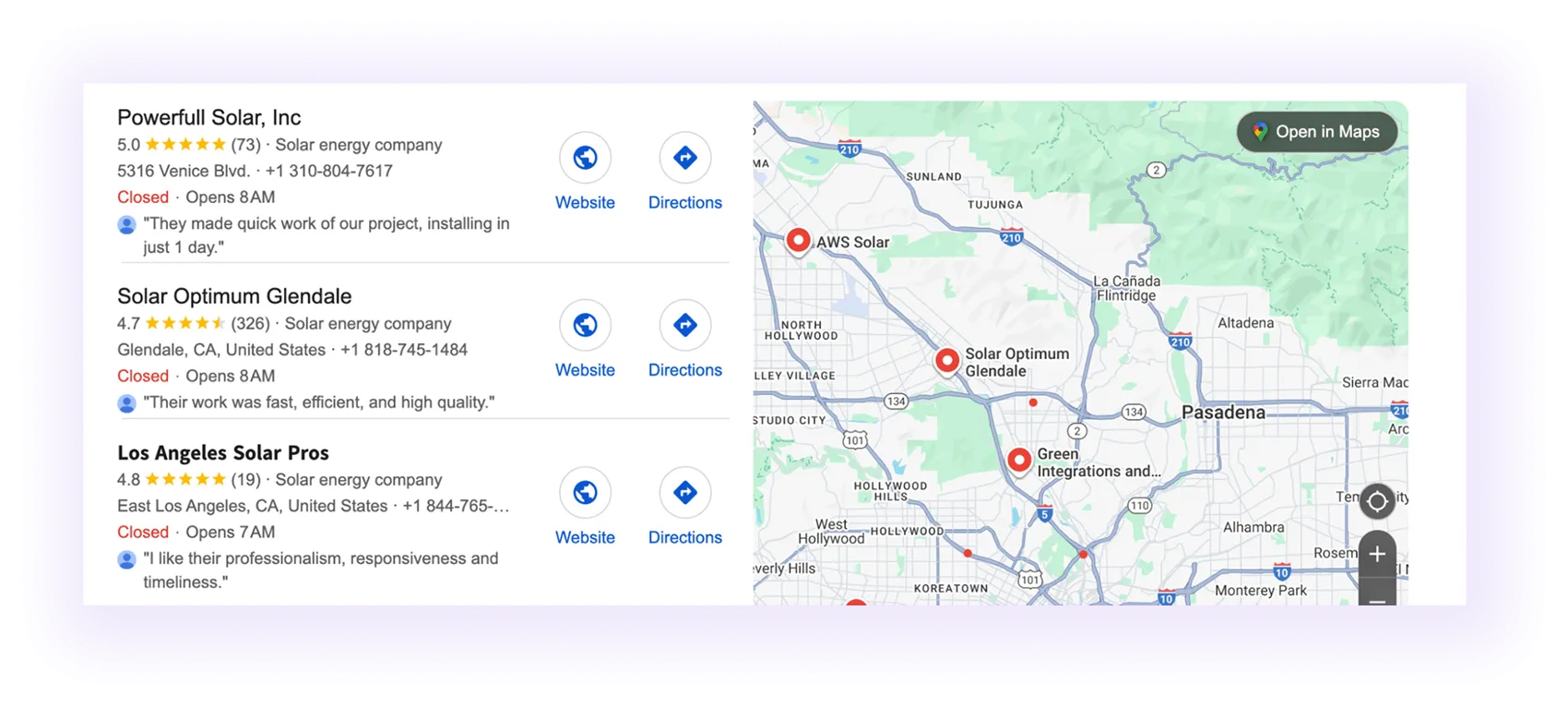
To rank well, every page on your solar website needs original, high-value content that speaks directly to what homeowners and building owners care about most. Avoid duplicates, use readable text, and keep each page focused on intent.
Rule #1: Use keywords strategically: Include your main keywords in headings (H1–H3) to help Google understand page structure and relevance.
Rule #2: Add supporting visuals: Use images of real solar panels, installations, or battery storage systems with descriptive, keyword-rich alt text.
Rule #3: Build credibility with trust signals:




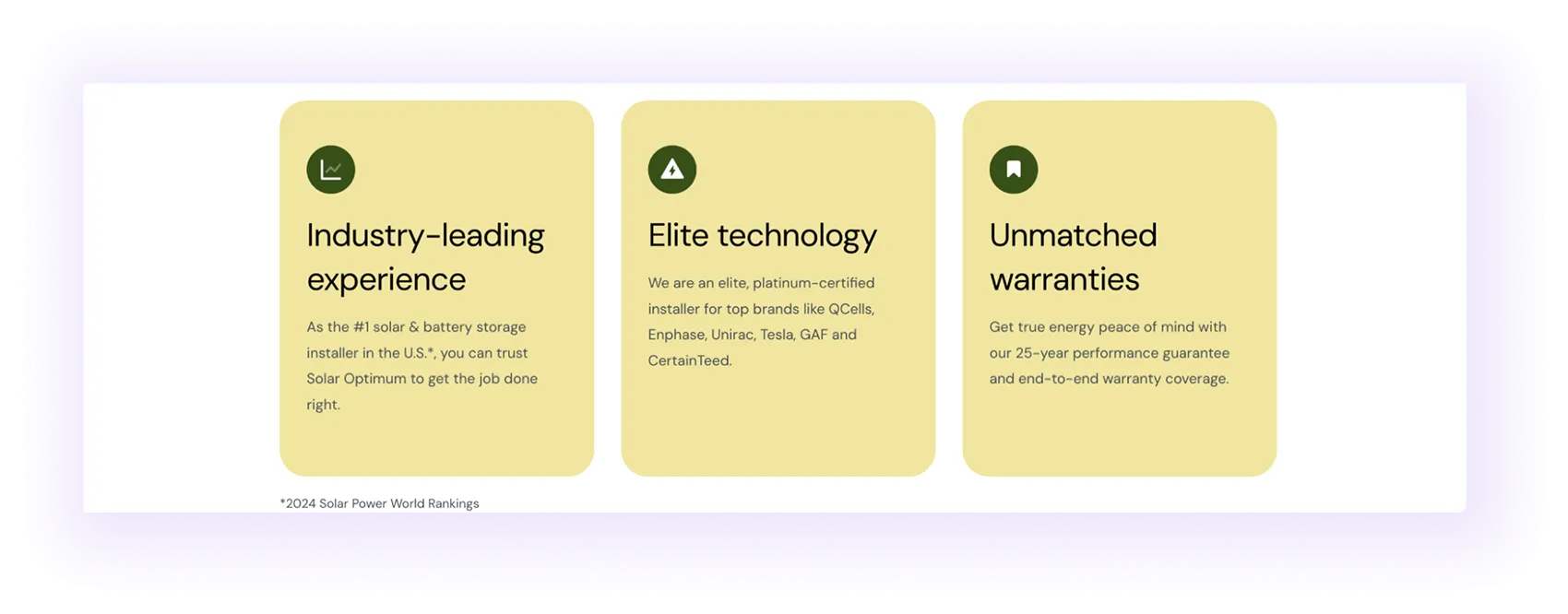
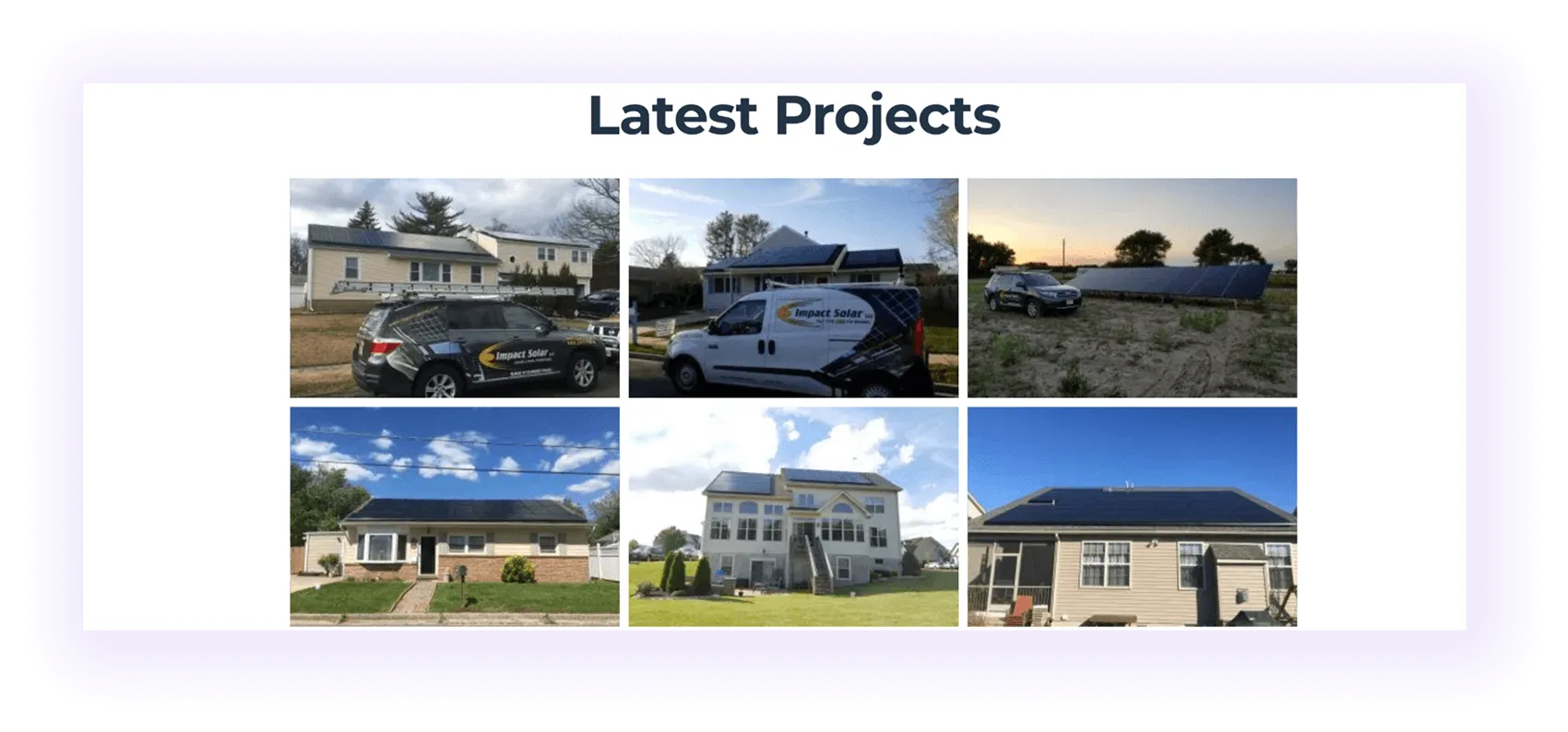
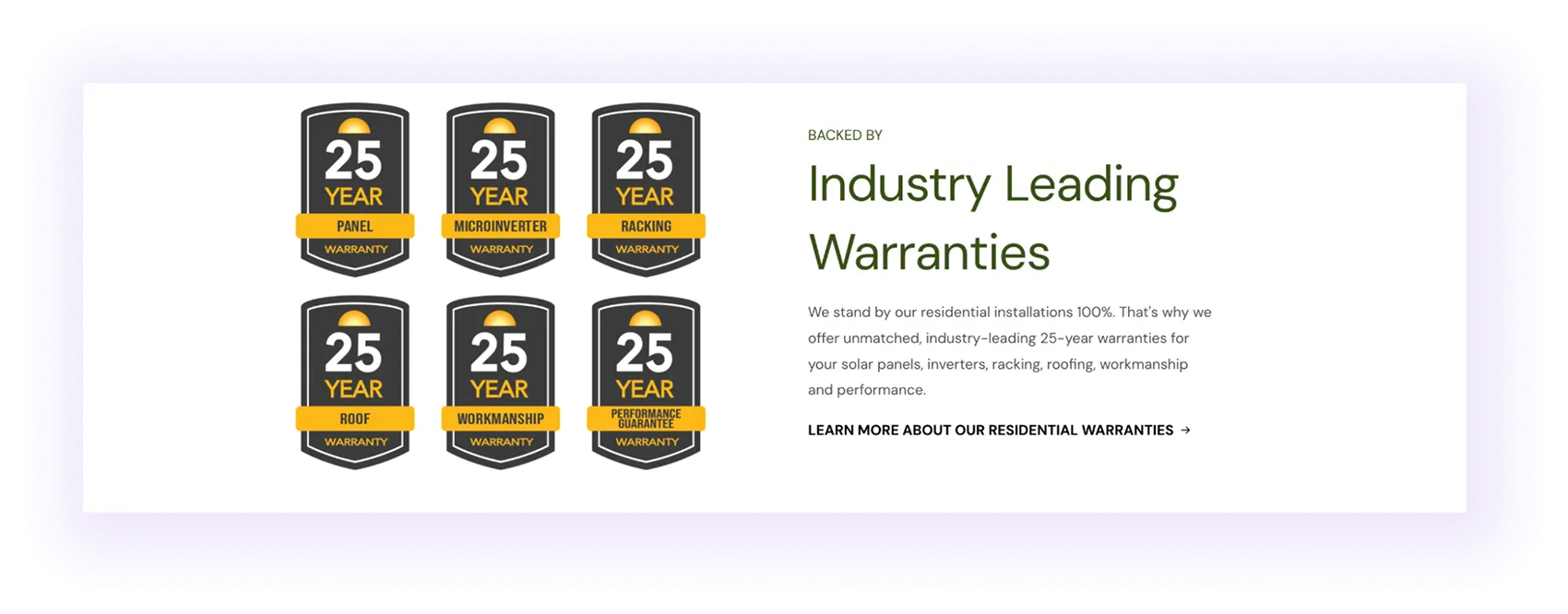
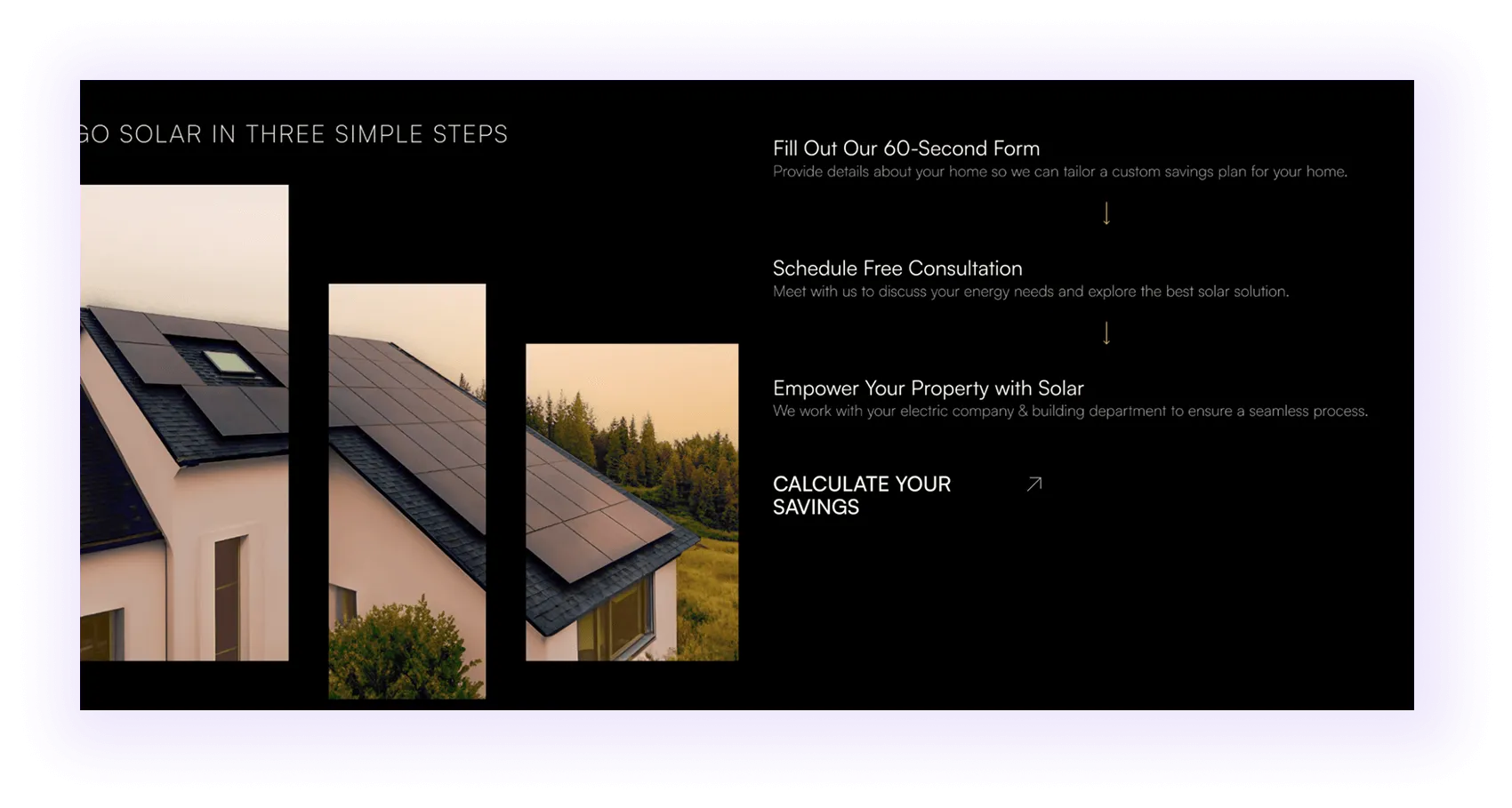

As we said, your blog educates homeowners automatically, so your sales team doesn’t have to keep answering the same solar questions. It’s also one of the best content strategies to attract people already searching for those answers online.
Common solar questions people Google include:
Step 1: Start with honest conversations. Write posts based on the questions you hear most from customers, like “Do I need a battery for my solar system?” or “What happens to my solar panels during winter?”
Step 2: Find more ideas online.
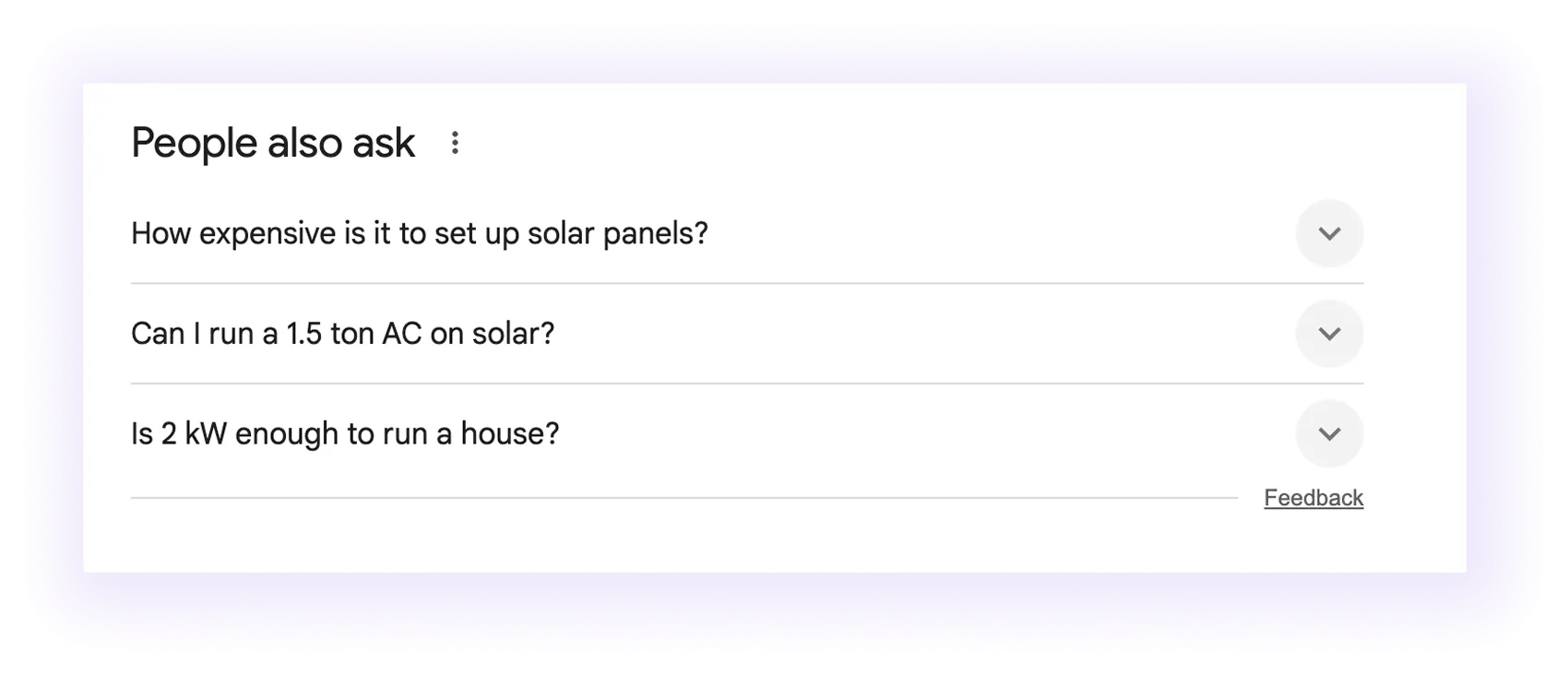
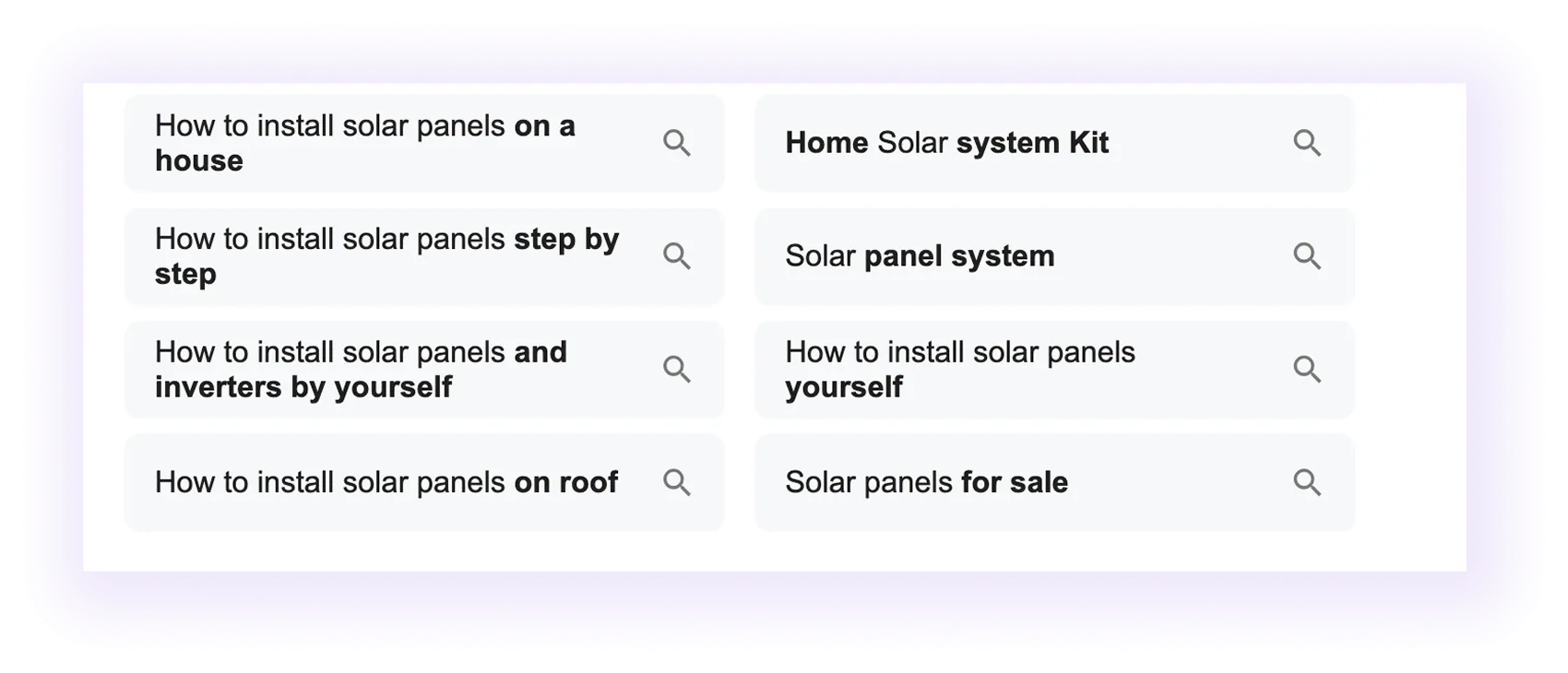
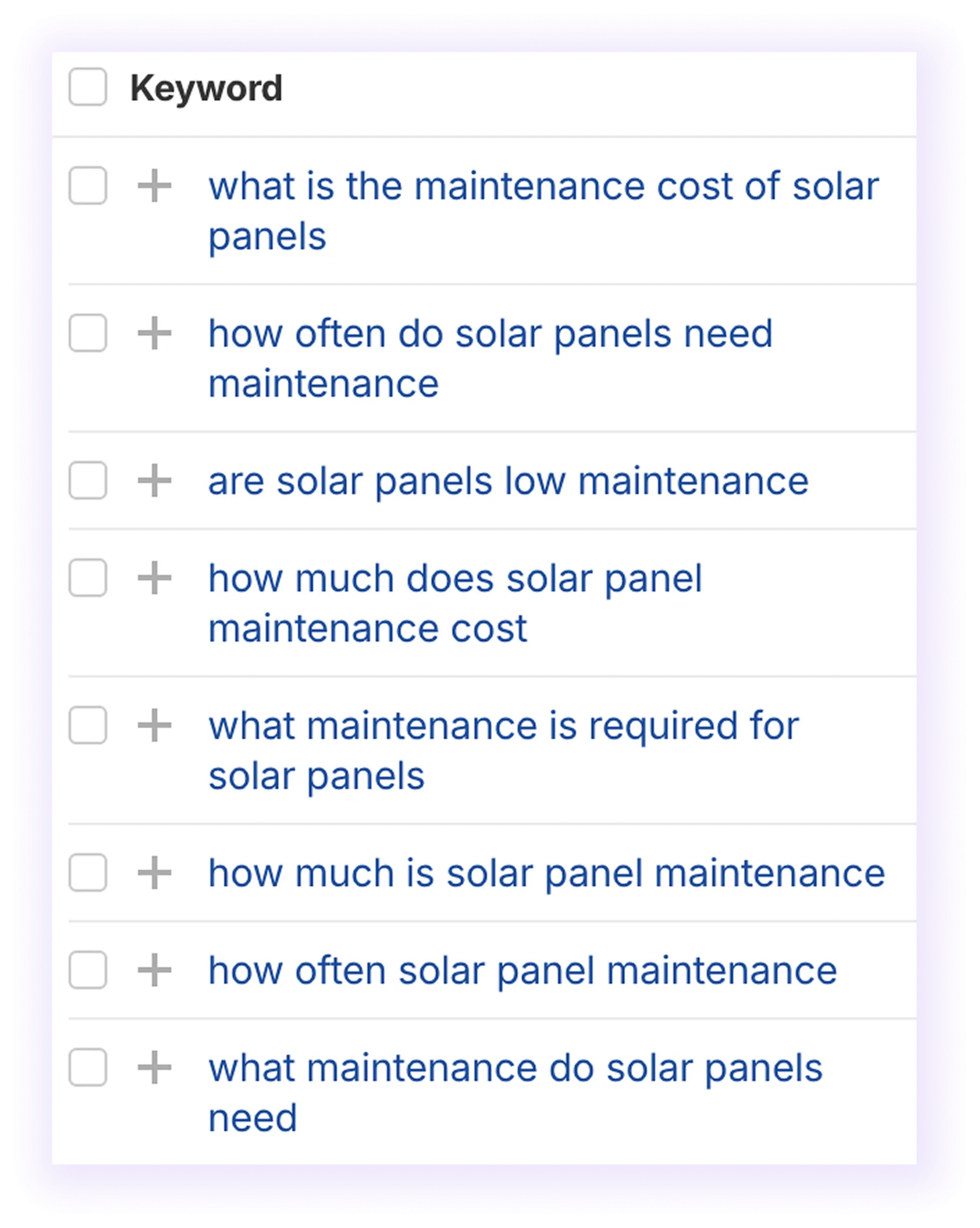
Step 3: Create content with real insight.
Write original, experience-based answers. Add photos or short clips that show how to clean panels safely or monitor system output. Use a clear heading structure (H1-H3).
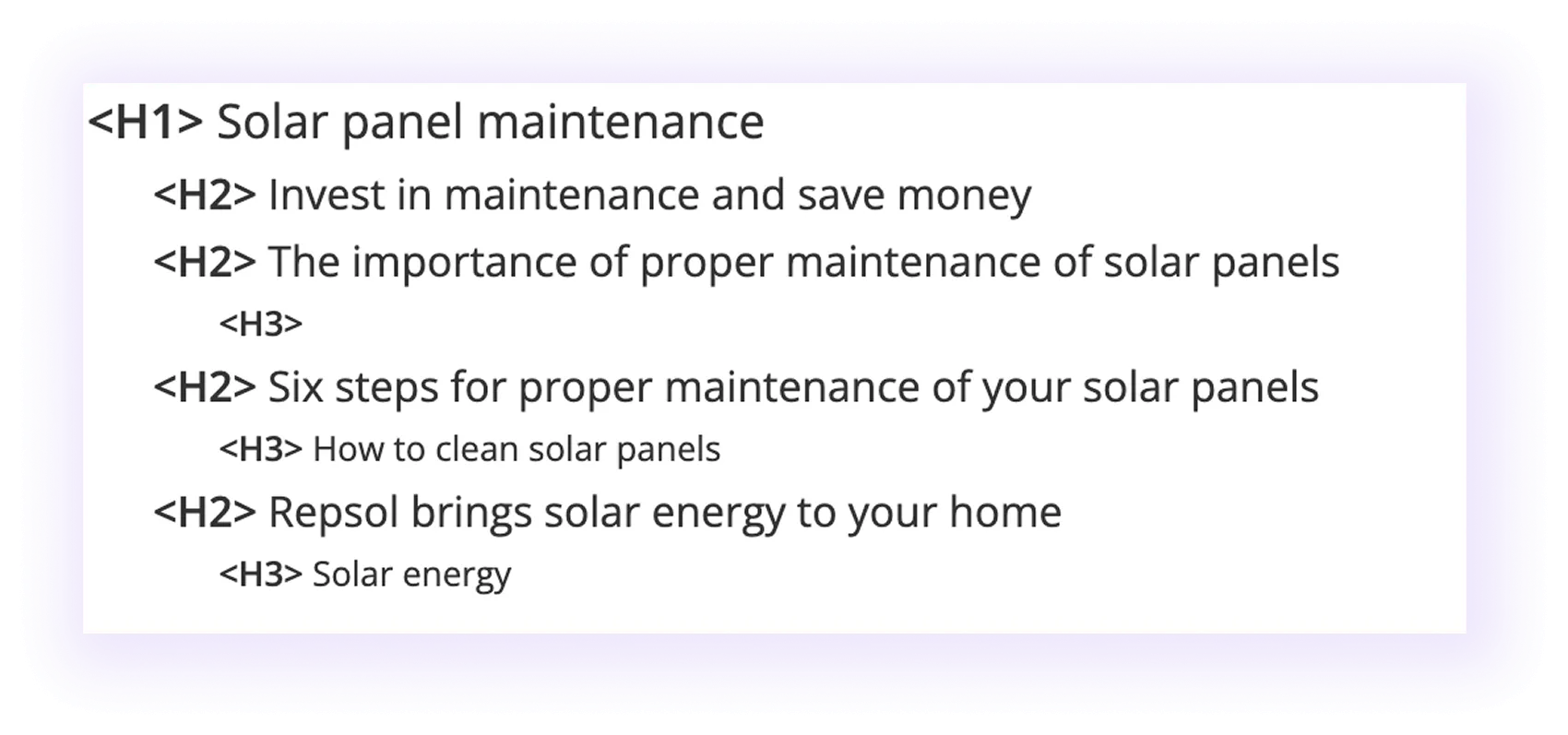
Include your keywords naturally in both your text and meta tags.

Pro tip: Before writing, Google your topic and check the top five results. See what’s missing, then add your professional perspective or local examples (e.g., how solar performs in Texas heat or New York winters). That’s what helps your blog stand out and rank.
Step 4: Use a pillar-cluster strategy.
Link each cluster back to your main service page so Google clearly understands your site structure and recognizes your solar company as an authority.
Next comes technical SEO, the part that ensures Google can find, index, and load your solar website fast on any device. It’s about structure, speed, and usability.
Let’s optimize your site based on the most important factors in the tech SEO roadmap.
Start by making sure Google can crawl and index your key solar pages (service, location, and blog pages) while blocking thin or duplicate ones (thank-you pages, tests, etc.).
You’ll need two essential files:
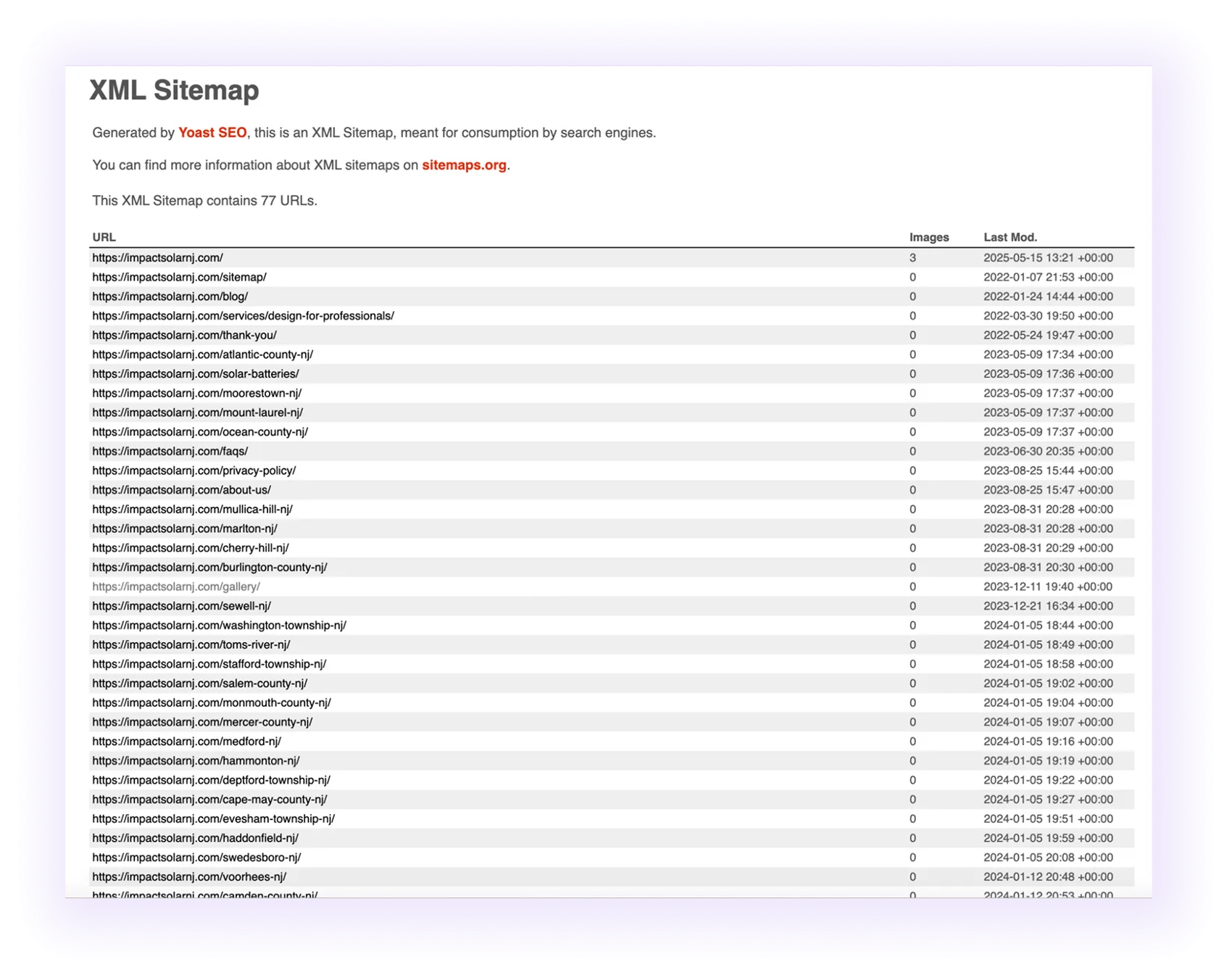
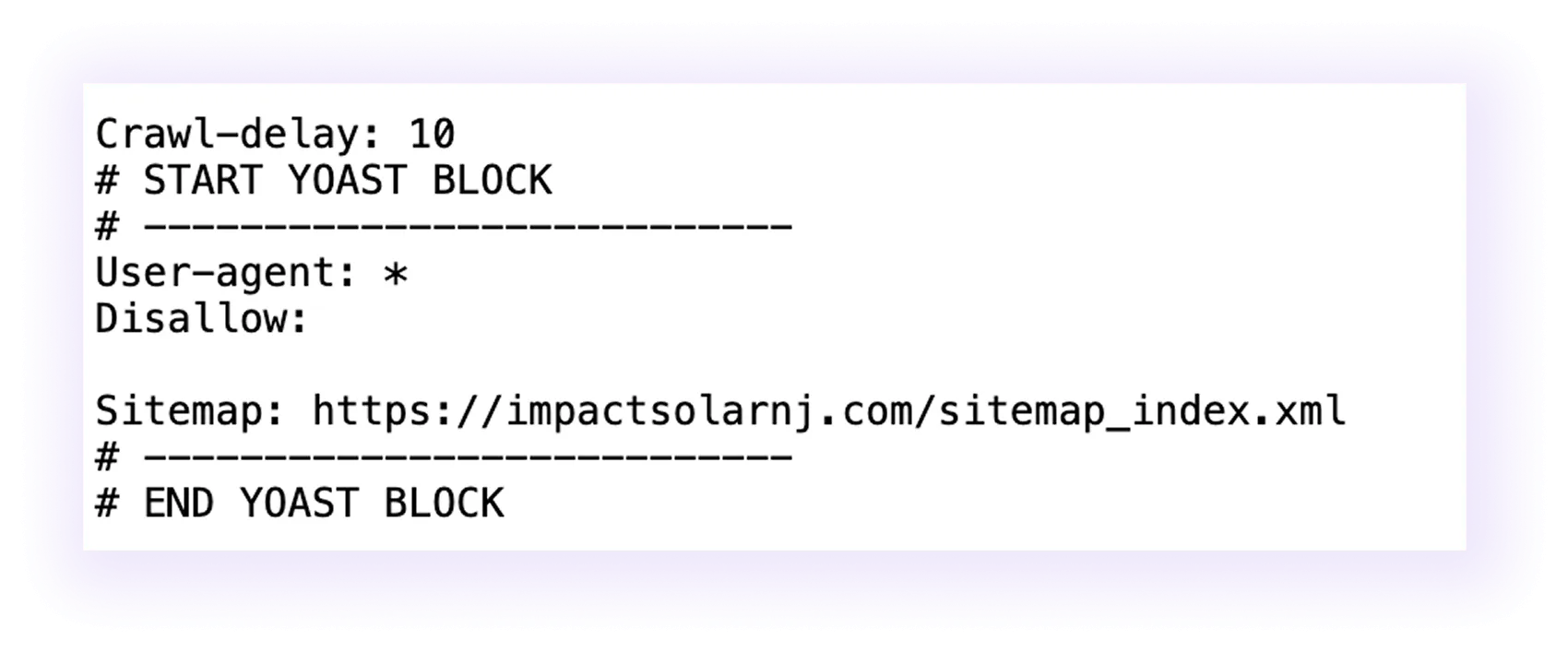
In your sitemap, assign priority levels to guide Google toward your most valuable pages:
Next, let’s set up the schema markup.
To make your solar website stand out with rich results (FAQs, reviews, or service details), add schema markup (structured data). It helps Google understand your content and display extra info directly in search results.

Best Schema Types for Solar Companies:
Your solar website need proper URLs that follows those best practices:
Good Example:
https://www.yoursolarcompany.com/services/solar-installation/
Bad Example:
https://www.yoursolarcompany.com/service?id=123&cat=solarPanels
Strong internal linking also helps Google better understand your solar website’s structure and pass authority from high-traffic pages to those targeting tougher keywords.
Here’s how to set it up effectively:
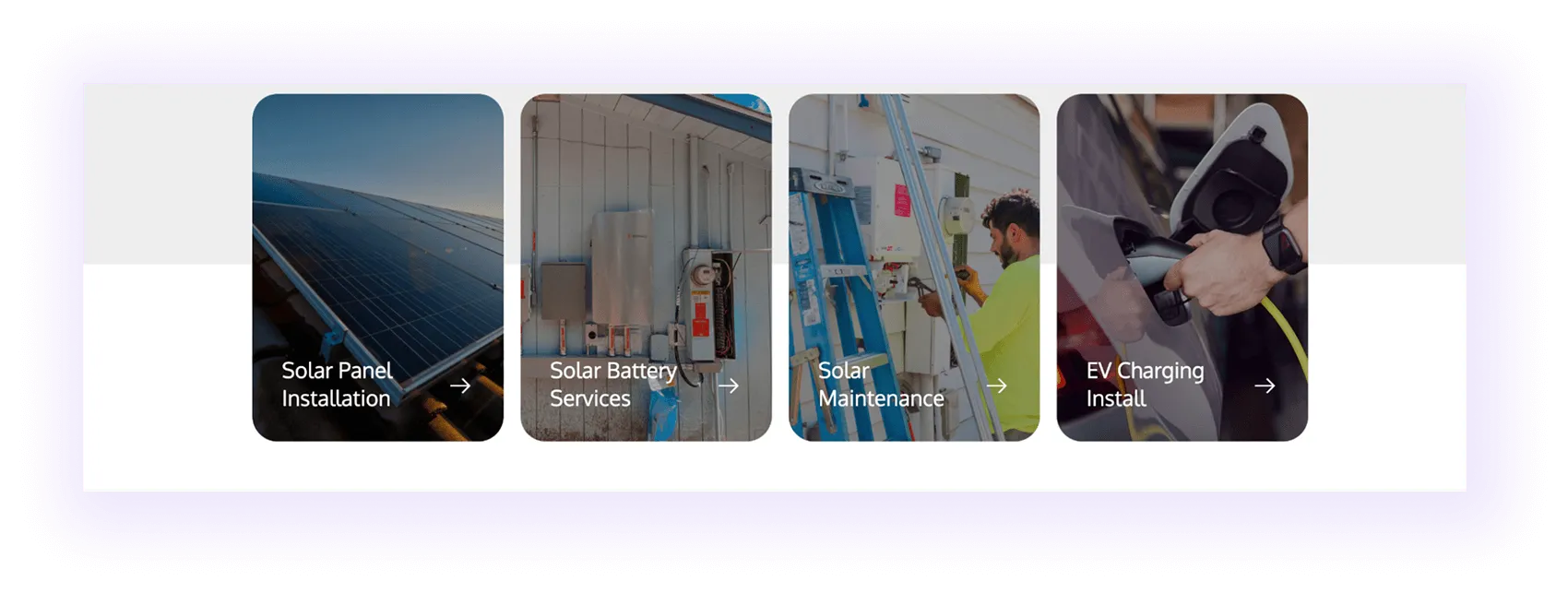

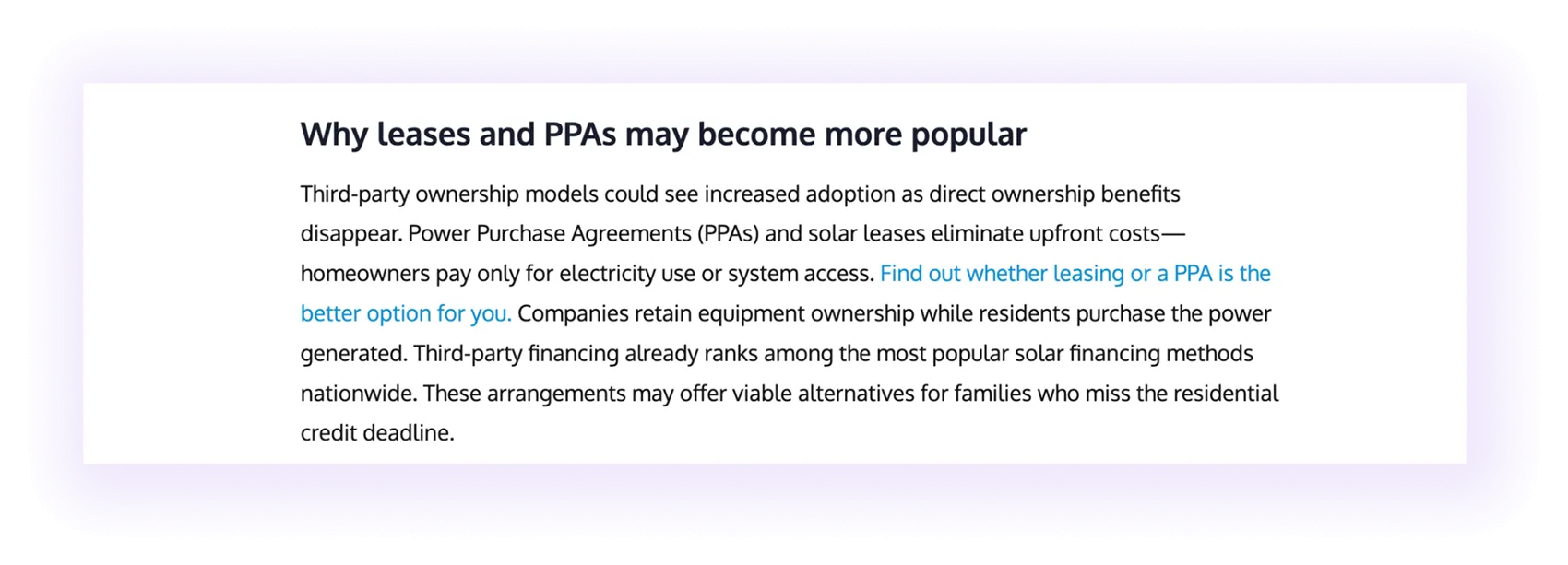
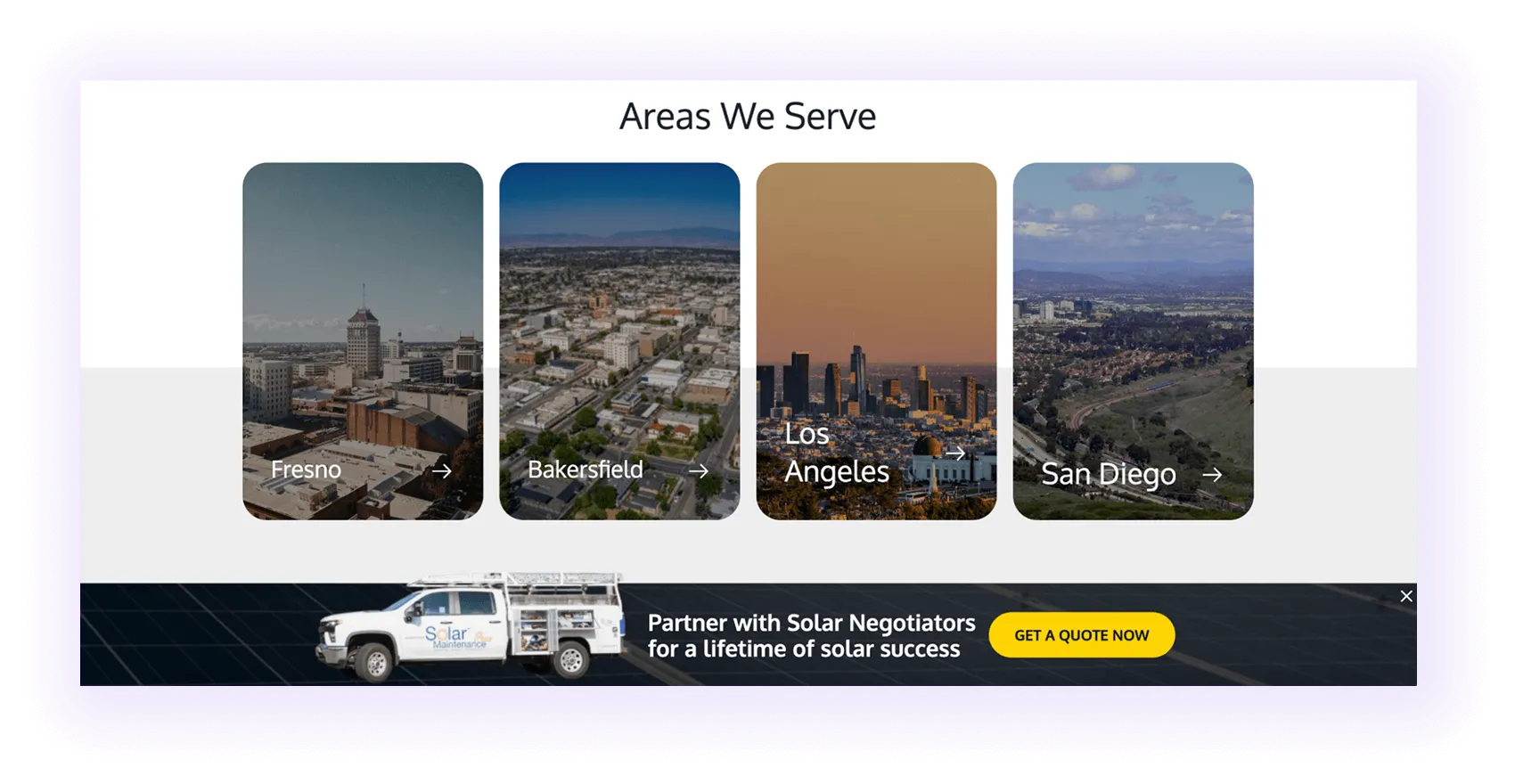
Nearly 60% of people searching for solar services do it on their phones, and most leave if a site’s slow or hard to use.
Since Google ranks mobile-friendly sites higher, you should optimize your website for mobile, and here’s how:
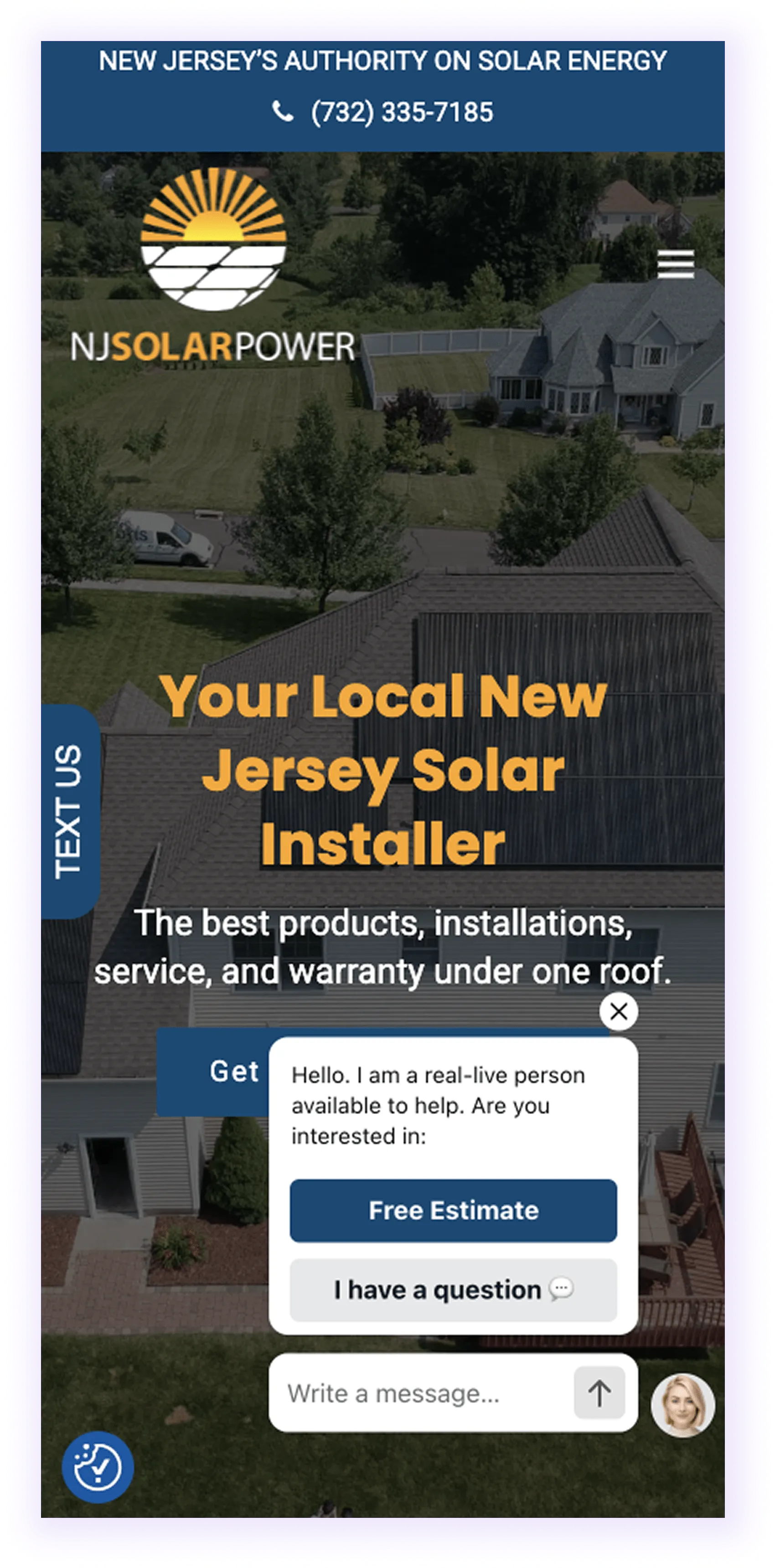
A slow solar website costs you leads. Homeowners won’t wait for a page to load, Google won’t either. Page speed directly impacts both rankings and conversions, so keeping your solar site fast is non-negotiable.
How to improve your site’s performance:
Track your performance using GTmetrix or Google PageSpeed Insights, focusing on Core Web Vitals:
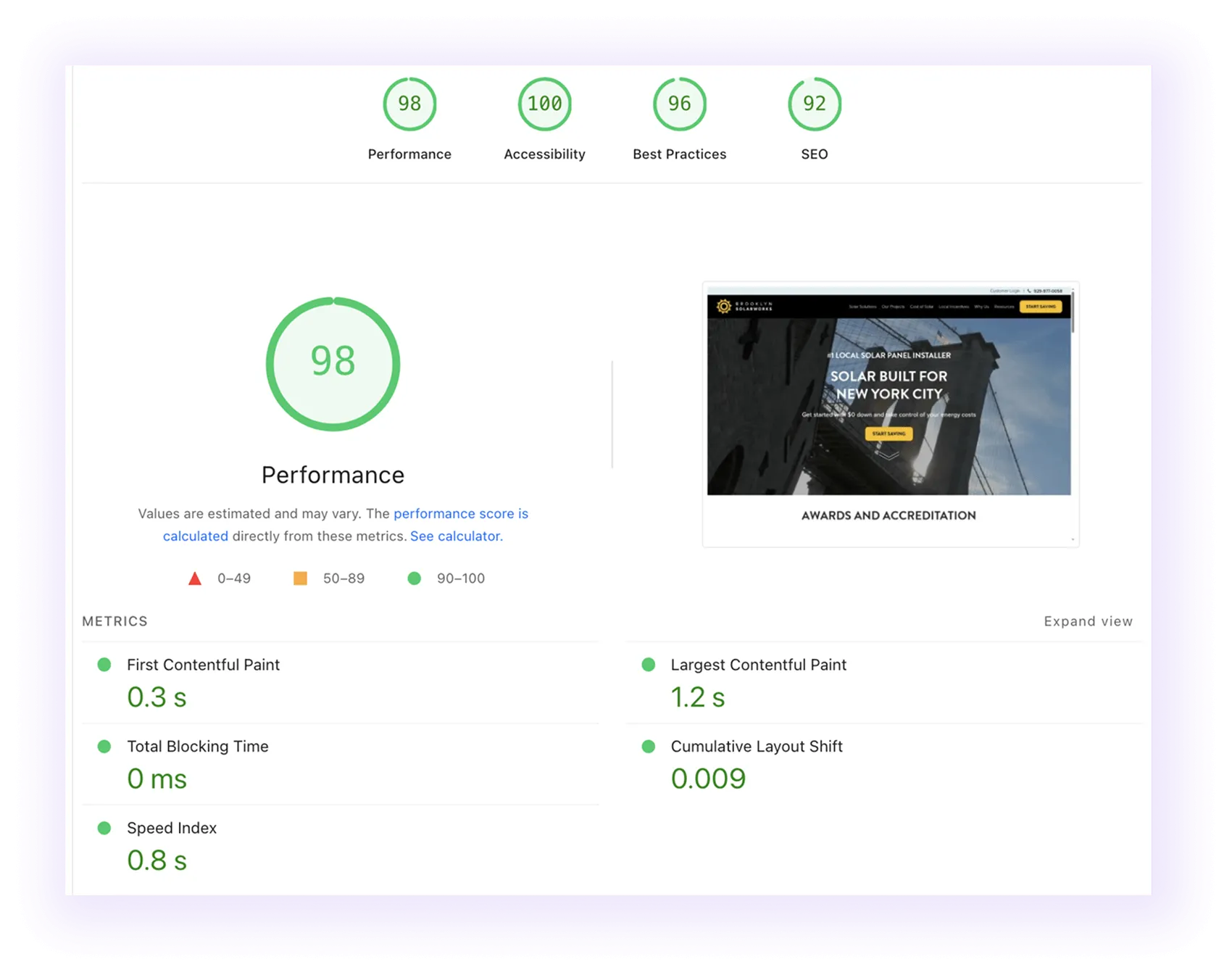
When your solar site passes Google’s Core Web Vitals, you’ll see higher visibility, smoother UX, and a site that converts visitors into inquiries.
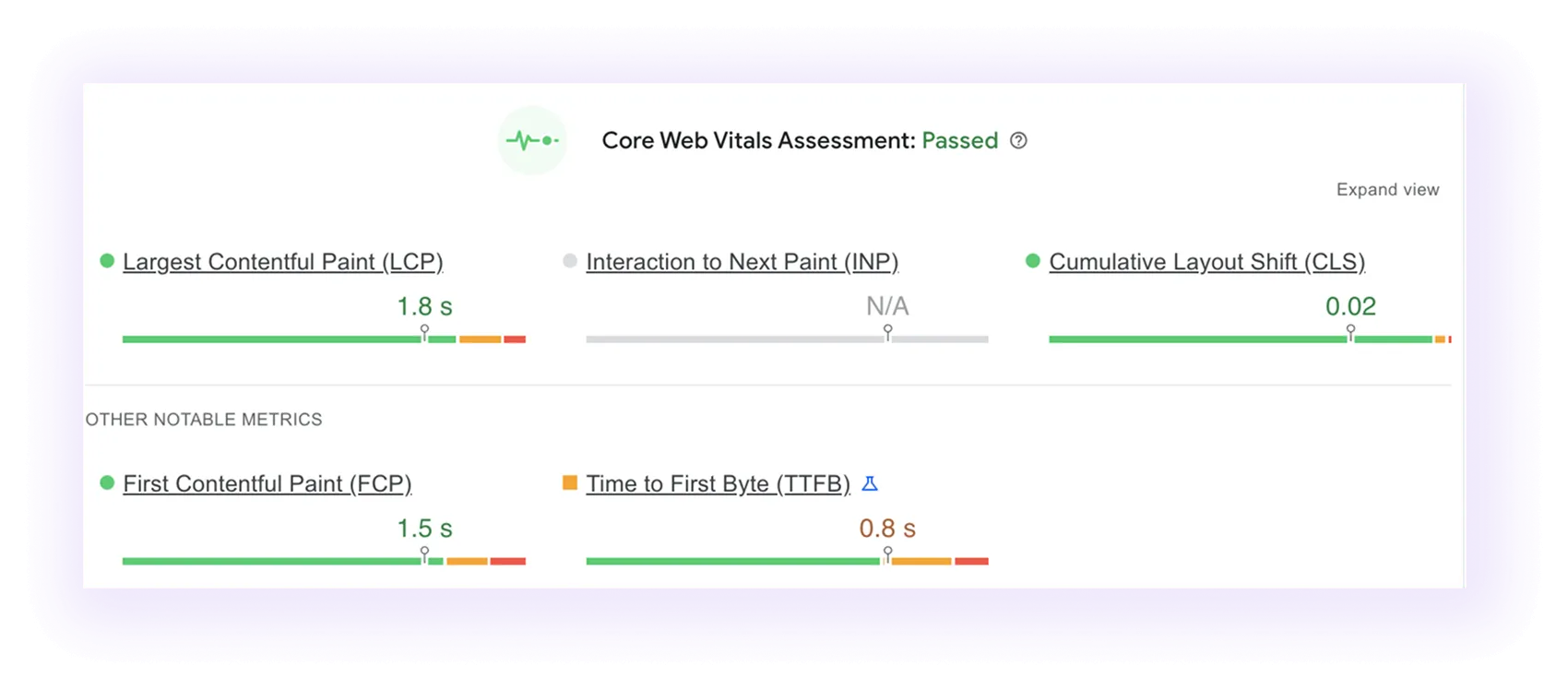
Even the best solar websites can develop issues over time: broken links, slower load speeds, or indexing errors that quietly hurt rankings. Regular audits keep your site running fast, clean, and fully optimized.
Run a monthly audit using:
Or, get a free technical SEO audit from our experts and find out what’s holding your solar site back, and how to fix it fast.
Your on-site SEO for solar companies is in place; time to tackle off-site SEO, the part that builds your authority beyond your website.
Without strong authority signals, Google is less likely to rank your pages high in search results. A proper editorial link building strategy is key, so let’s build you one using three methods.
1. Guest posting means writing an article that shares your solar expertise, like installation tips, financing insights, or sustainability trends, and publishing it on another website with a link back to yours.
2. Link insertion is when you insert a link in an existing, relevant article, enhancing it with your professional input or data..
When selecting sites, focus on high-authority, solar-relevant domains (check their Domain Rating in Ahrefs). Good niche targets include:
Before exploring the next strategy, businesses seeking faster gains in authority and traffic often rely on professional backlink outreach services, an approach many solar company owners find effective.
Next up, directory listings, which involve adding your site to trusted directories, boost authority, visibility, and local search rankings.
When submitting your solar business for location-based backlink building, make sure to:
Here’s how a complete solar directory profile should look:
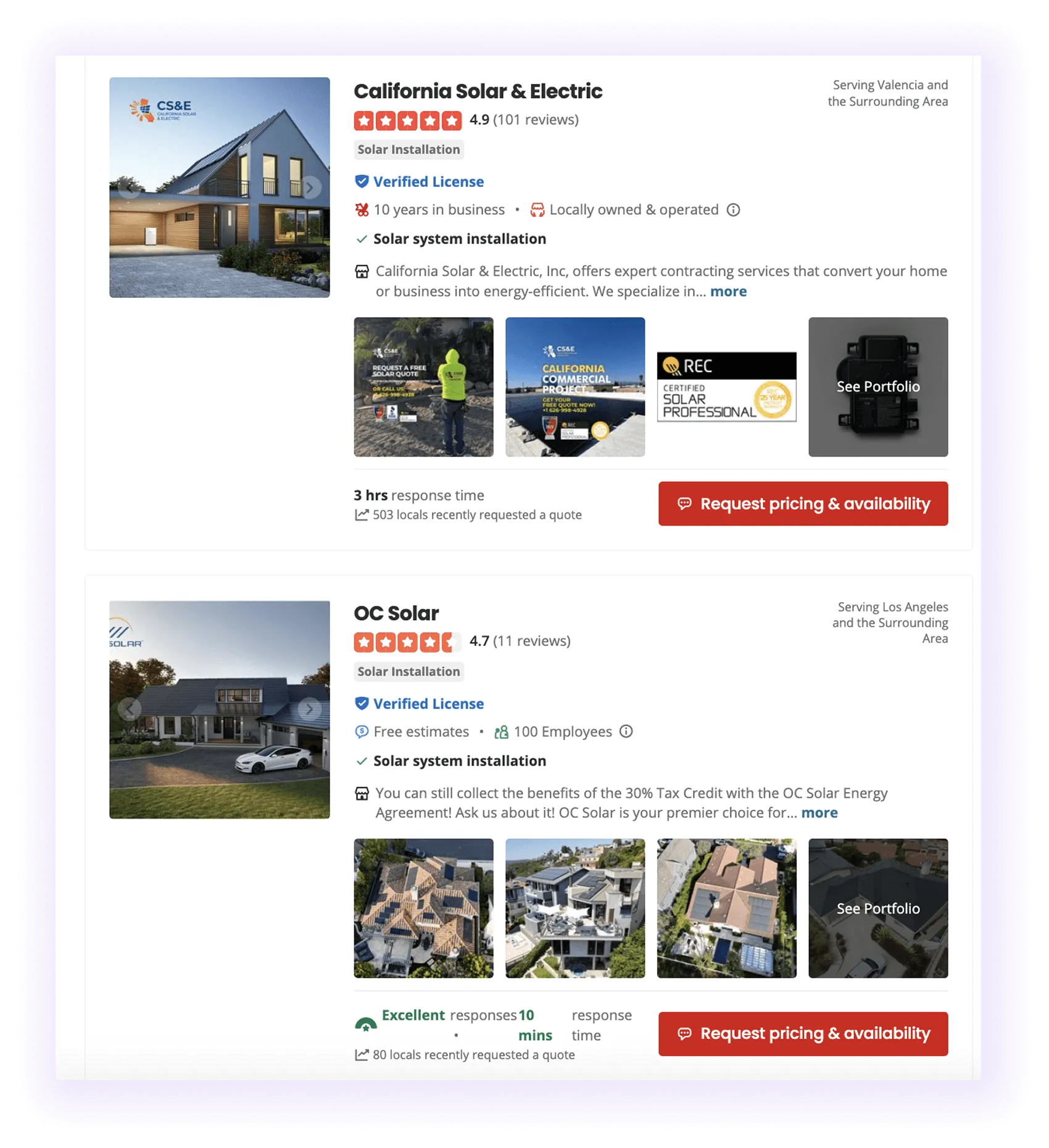
There are three main types of directories you should focus on:
Digital PR delivers it faster and stronger than all the methods above. By earning mentions on high-authority sites like Forbes, Energy Digital, or PV Magazine, your solar company gains both credibility and powerful backlinks.
Here’s how to secure those links effectively:
Next and final step, tracking performance: seeing which pages drive traffic, leads, and authority using SEO reporting software and tools. Consistent monitoring helps you spot what’s working and where to improve, keeping your solar SEO strategy effective over time.
You can follow every step here and still struggle to outrank big solar brands, not because you’re doing it wrong, but because you need expert guidance.
We’re a solar SEO agency that’s helped 30+ companies just like yours grow traffic, leads, and revenue. Let’s do the same for you. Contact us today to get started.
Submit the form - Get Free Proposal
%202.png)
24 hours